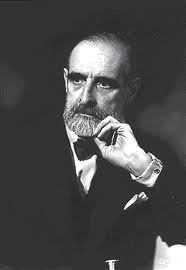Francesc Cambó facts for kids
Quick facts for kids
Francesc Cambó i Batlle
|
|
|---|---|
 |
|
| Born | 2 September 1876 |
| Died | 30 April 1947 (aged 70) |
| Occupation | politician |
Francesc Cambó i Batlle (born September 2, 1876 – died April 30, 1947) was an important Spanish politician from Catalonia. He was a conservative leader who started the Lliga Regionalista party, which wanted more self-rule for Catalonia. Francesc Cambó also served as a minister in different Spanish governments. He loved art and culture, helping to translate old Greek and Latin books into the Catalan language.
Contents
Francesc Cambó's Life Story
Francesc Cambó was born in a town called Verges in Catalonia, Spain. This was on September 2, 1876. His full name was Francesc (Francisco de Asís) Cambó y Batlle.
Early Political Life and Catalan Identity
Francesc Cambó was a very important person in Catalan politics in the early 1900s. From a young age, he joined and helped create groups that supported the Catalan region. In 1901, he started a new political party called the Lliga Regionalista de Catalunya. That same year, he became a city council member in Barcelona.
He once gave a speech to King Alfonso XIII in Barcelona. In his speech, Cambó said that Catalonia needed a solution to its "Catalan problem." He believed this solution should be "in Spain" and within the monarchy. This speech made some of his political rivals angry.
In 1904, the Catalan political movement split. Cambó wanted a more careful approach to Catalan identity and power. He became a main leader of the conservative part of the movement, along with Enric Prat de la Riba.
In 1906, Cambó led a movement called "Solidaritat Catalana" (Catalan Solidarity). This was a response to a new law that many people in Catalonia did not like. This movement became very popular. In the 1907 elections, it won 41 seats in the Spanish Parliament.
With this strong support, Cambó tried to push his ideas. He wanted Catalonia to have more power but still work with the Spanish government. Some people in Madrid thought he secretly wanted Catalonia to be independent. Others in Barcelona thought he was not doing enough for Catalonia.
A famous politician once told him, "You cannot be Catalonia’s Simon Bolívar and Spain’s Bismarck at the same time." This meant he couldn't be a revolutionary leader for Catalonia and a powerful national leader for Spain.
Cambó became a Spanish Minister twice. In 1918, he was the Minister of Development and Public Investment. In 1921, he became the Minister of Finance.
Stepping Away from Politics and Later Years
When General Primo de Rivera took control of Spain in 1923, Cambó left active politics. He then focused on business and writing books. His books were about politics, including his thoughts on the Middle East and dictatorships.
In 1930, he wrote a book called "Per la Concòrdia" (In favor of Harmony). In this book, he tried to find a way for the Spanish monarchy and Catalonia's self-rule to work together. In 1931, he started a new party called the "Constitutional Center." He hoped it could stop the rise of the Spanish Republic.
After the Second Spanish Republic was declared in 1932, Cambó moved to France for a short time. In 1933, he changed his old party's name to Liga Catalana (Catalan League). He was elected to Parliament for the last time in November 1933.
The Spanish Civil War and Life in Exile
When General Francisco Franco started a revolt against the Republic in July 1936, Cambó was not in Spain. There is no proof he was directly involved with the rebels. However, Cambó did give money to the Nationalist side for things that were not military during the Spanish Civil War. He believed that if the Republicans won, Spain might fall under the control of Moscow and Communism.
Francesc Cambó never lived in Spain again after the Civil War. He lived in exile with his family in Paris and Switzerland. In 1942, he moved to Buenos Aires, Argentina, where he died in 1947. He had a daughter named Helena. In 1976, his body was brought back to Barcelona. He was buried at the Montjuïc Cemetery.
An Art Collector and Supporter of Culture
Even though he was known as a politician, Cambó had many other interests. As a young lawyer, he once helped the famous dancer Nijinsky avoid jail.
In 1918, Cambó made a lot of money from business deals related to electricity. After this, he became one of the most important art collectors and cultural supporters in Spain. He used some of his money to live well and to help many social and cultural projects.
He supported educational projects for women, like those by Francesca Bonnemaison. Many of his projects helped strengthen the Catalan language. For example, he funded the Collection Bernat Metge, which translated all classic Greek writers into Catalan. He also paid for the most important Catalan Dictionary by the linguist Pompeu Fabra. He even helped fund a new translation of the Bible into Catalan.
Cambó gave almost all his artworks to public museums. Today, you can see the Cambó Bequest at the Prado Museum in Madrid and the MNAC in Barcelona.
Why Francesc Cambó is Still Discussed
Francesc Cambó is still a topic of discussion today. Historians are interested in parts of his life, like his financial support during the Civil War. They also look at his possible links to politicians in Argentina later in his life.
His political idea of a "strong Catalonia in a Great Spain" is still important. Some political leaders who want Catalonia to stay part of Spain find inspiration in his ideas. Others who support Catalonia's independence criticize his views.
See also
 In Spanish: Francisco Cambó para niños
In Spanish: Francisco Cambó para niños
 | Percy Lavon Julian |
 | Katherine Johnson |
 | George Washington Carver |
 | Annie Easley |

